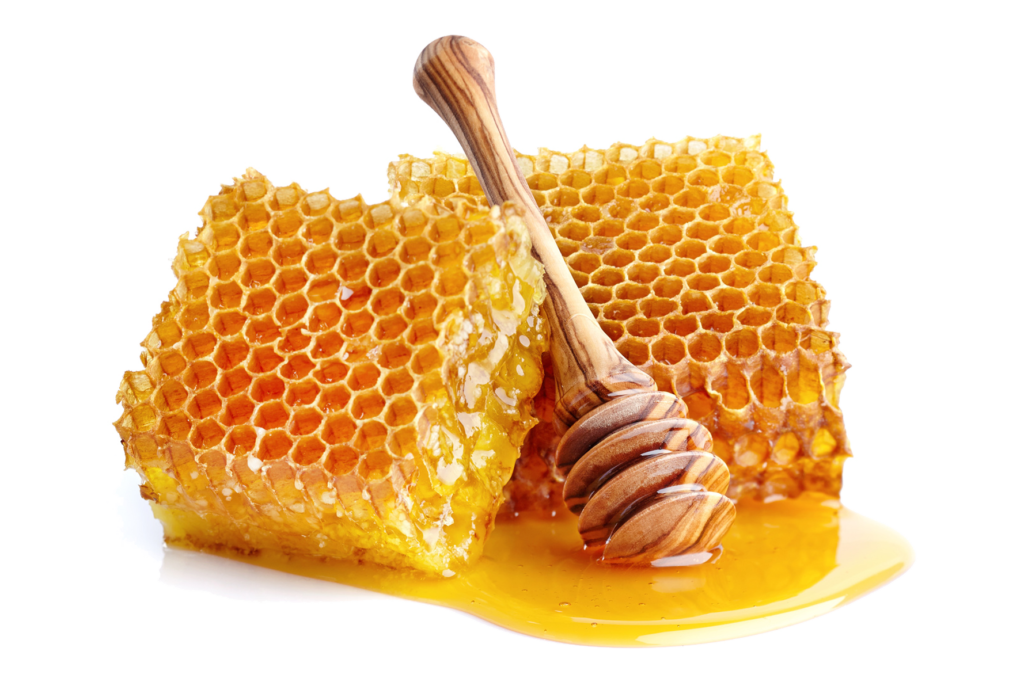The Healing Power of Honey

Raw honey has been used as a folk remedy throughout history and has a variety of health benefits and medical uses. Many of these health benefits are specific to raw, or unpasteurised, honey.
Most of the honey you find in grocery stores is pasteurized. The high heat kills unwanted yeast, improves the colour and texture, removes any crystallization, and extends the shelf life. Many of the beneficial nutrients are also destroyed in this process.
Health Benefits of Honey
Some of the health benefits raw honey has to offer include:
1. A good source of antioxidants
Raw honey contains an array of plant chemicals that act as antioxidants. Some types of honey have as many antioxidants as fruits and vegetables. Antioxidants help to protect the body from cell damage due to free radicals.
Free radicals contribute to the aging process and may also contribute to the development of chronic diseases such as cancer and heart disease. Research shows that antioxidant compounds in honey called polyphenols may play a role in preventing heart disease.
2. Antibacterial and antifungal properties
Research has shown that raw honey can kill unwanted bacteria and fungus. It naturally contains the antiseptic hydrogen peroxide. Its effectiveness as an antibacterial or antifungal varies depending on the honey, but it’s clearly more than a folk remedy for these kinds of infections.
3. Burns
Honey has been shown in various studies to be an extremely effective treatment for burns. It has various antibacterial compounds that have yet to result in bacterial resistance, and its moist nature helps keep burned skin supple and reduces moisture loss.
If you use honey to treat minor burns, simply spread honey over the burn and cover lightly with gauze. Honey does not need to be refrigerated, but it feels good on a burn if it’s chilled.
Manuka honey is used in medical settings to treat wounds because it’s been found to be an effective germ killer and also aids in tissue regeneration. Studies show that Manuka honey can boost healing time and reduce infection. Keep in mind that the honey used in hospital settings is medical grade, meaning it’s inspected and sterile. It’s not a good idea to treat cuts with honey you buy from a store.
4. Coughs and colds
Studies have shown that regularly eating raw honey helps prevent colds.
It also helps soothe coughs and sore throats. It is especially effective in suppressing dry irritating coughs as it has a demulcent effect. Its viscous texture coats the irritated membranes in the throat thus suppressing the cough. In fact research has shown that honey is as effective as dextromethorphan, a common ingredient in over-the-counter cough medications. Just take one or two teaspoons of honey. In addition, its antibacterial properties help fight throat and upper respiratory tract infections
Honey can be added to hot tea with lemon when a cold hits you. Alternatively, you can make a healing cough syrup by gently heating raw honey and mixing in healing herbs such as sliced ginger, steeping for a few hours, and straining out the herbs.
5. Phytonutrient powerhouse
The phytonutrients in honey are responsible for its antioxidant properties, as well as its antibacterial and antifungal power. They’re also thought to be the reason raw honey has shown immune-boosting and anticancer benefits. In addition, they have been shown to help improve cholesterol levels and reduce triglyceride levels. Heavy processing destroys these valuable nutrients.
6. Help for digestive issues
Studies have shown that honey helps relieve the symptoms of irritable bowel syndrome (IBS). When taken on an empty stomach, raw Manuka honey soothes the stomach and reduces diarrhoea and constipation symptoms. Honey reduces the severity and duration of viral diarrhoea better than conventional antiviral treatment.
Research has also shown that honey is effective as a treatment for Helicobacter pylori (H. pylori) bacteria which is the main cause of stomach ulcers.
7. Allergies
Interestingly enough, eating raw honey regularly may prevent allergic symptoms, particularly those of hay fever. Because raw honey contains residual pollen and other plant components, the theory is that the low levels of exposure, such as occurs with allergy shots, may reduce sensitivity to common allergens.
8. Wound healing
Some interesting studies have shown that honey is a remarkable wound healer, especially for diabetics who have trouble with minor wounds developing into ulcers. It may even reduce scarring and tends to be less painful than conventional antiseptics.
9. Supports Reproductive Health
Royal jelly is a type of honey which has numerous effects on female reproductive health. It has been found to reduce premenstrual syndrome (PMS) and menopausal symptoms. The antioxidants in royal jelly may help reduce oxidative damage associated with the aging of the ovaries. Initial animal studies have shown that royal jelly improves sperm quality, and although promising, this has yet to be proven in humans.
10. Cosmetics
Honey is good for dry skin due to its high moisture content. Its antibacterial properties may help with skin infections such as acne. Plain yogurt mixed with honey makes a soothing cleanser or facial mask. Sugar mixed with raw honey and sweet almond oil makes a moisturising exfoliant.
Are There any Risks with Honey?
In addition to beneficial prebiotics and nutrients, raw honey can also carry harmful bacteria such as Clostridium Botulinum. This is particularly dangerous for babies. Raw honey should never be given to infants less than a year old.
A doctor should be consulted if botulism is suspected in adults or children.
Honey is a very beneficial natural substance. There are different types of raw honey, such as wildflower honey, tupelo honey, organic honey, and clover honey. A good middle road is raw wildflower honey which contains the medicinal qualities of a variety of wildflowers, and when you’re trying to kill germs, the more germ-fighting constituents the better.
